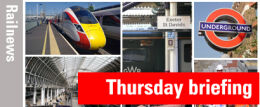Posted 16th September 2021 | No Comments
Air quality on some diesel trains 'worse than major roads'

Air quality on some diesel trains 'worse than major roads'
Research funded by the Department for Transport and carried out by the RSSB on diesel trains has found that in some cases air quality levels are poor, with concentrations of nitrogen dioxide peaking at levels ranging from 1 to 13 times higher than next to major roads in central London. The levels are still within the legal limits for workplaces, according to independent research, but the DfT has asked the RSSB to to publish the full findings. It has also commissioned a review of all the regulations and standards which currently control air pollution in stations and trains, along with further research. Rail minister Chris Heaton-Harris said: 'The safety of staff and passengers is our absolute priority. While these findings are within limits, I do not believe people should have to accept anything less than the highest levels of air quality. I have asked the industry to immediately conduct further research and explore all engineering modifications and options to rapidly improve air quality on trains and in stations. I have also launched a comprehensive review of the current standards and guidance related to air quality on the rail network. If required, we will not hesitate to strengthen legislation.'
Community rail partnerships encourage sustainable development, says report
A NEW report produced by the Community Rail Network with support from the Rail Delivery Group says local partnerships can stimulate sustainable development. The report illustrates how sustainable development relies heavily on community-level activities and engagement. Various projects which respond to local needs are mentioned in the report, including the support of local economies provided by the Devon and Cornwall Rail Partnership and the Bittern Line Community Rail Partnership, along with many CRPs supporting recovery from the pandemic. Petersfield and Swaythling stations in Hampshire are offering ‘Free Shops’, redistributing food and other items such as school uniforms to reduce waste and support those most in need, and redundant buildings at Haltwhistle station in the Tyne Valley are being converted to flexible office and studio space which uses solar power. Community Rail Network chief executive Jools Townsend said: 'Community rail is sustainable development in action at a grassroots level. Sustainable development is critical to everyone’s future, and communities need to be empowered and encouraged to lead the way, spearheading positive change.'
Northern Line extension is added to Underground map
Transport for London has unveiled a new Underground map showing the two stations on the Northern Line Extension, which is set to open next week. Final preparations are underway so that the stations at Battersea Power Station and Nine Elms can open their doors as planned. Major construction on the 3km twin-tunnel railway from Kennington began in 2015, and services on the extension will start from Battersea Power Station on Monday 20 September at 05.28. There will be a peak time service of six trains an hour at first, and headways will be halved by mid-2022, when there will be 12 trains an hour. Off-peak, there will be five trains an hour initially, and this will also double to 10 trains an hour next year. TfL said it had built the Extension £160 million under budget, bringing its estimated final total cost to £1.1 billion despite the cost pressures brought about by the pandemic. The new line, which was paid for by private sector developers involved with regeneration in the areas it serves, is the first addition to the Underground network since the Jubilee Line extension through Docklands opened in 1999.
